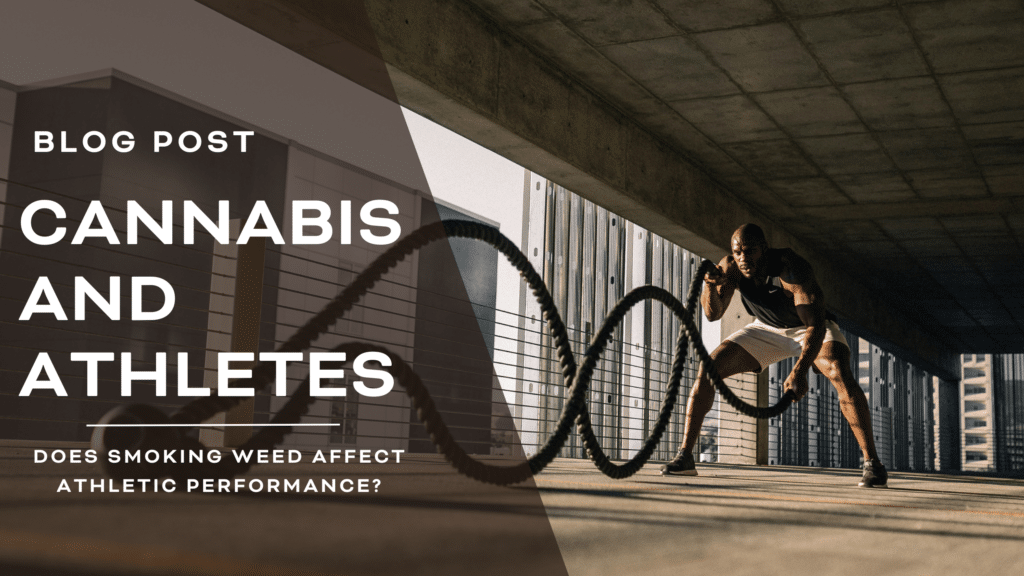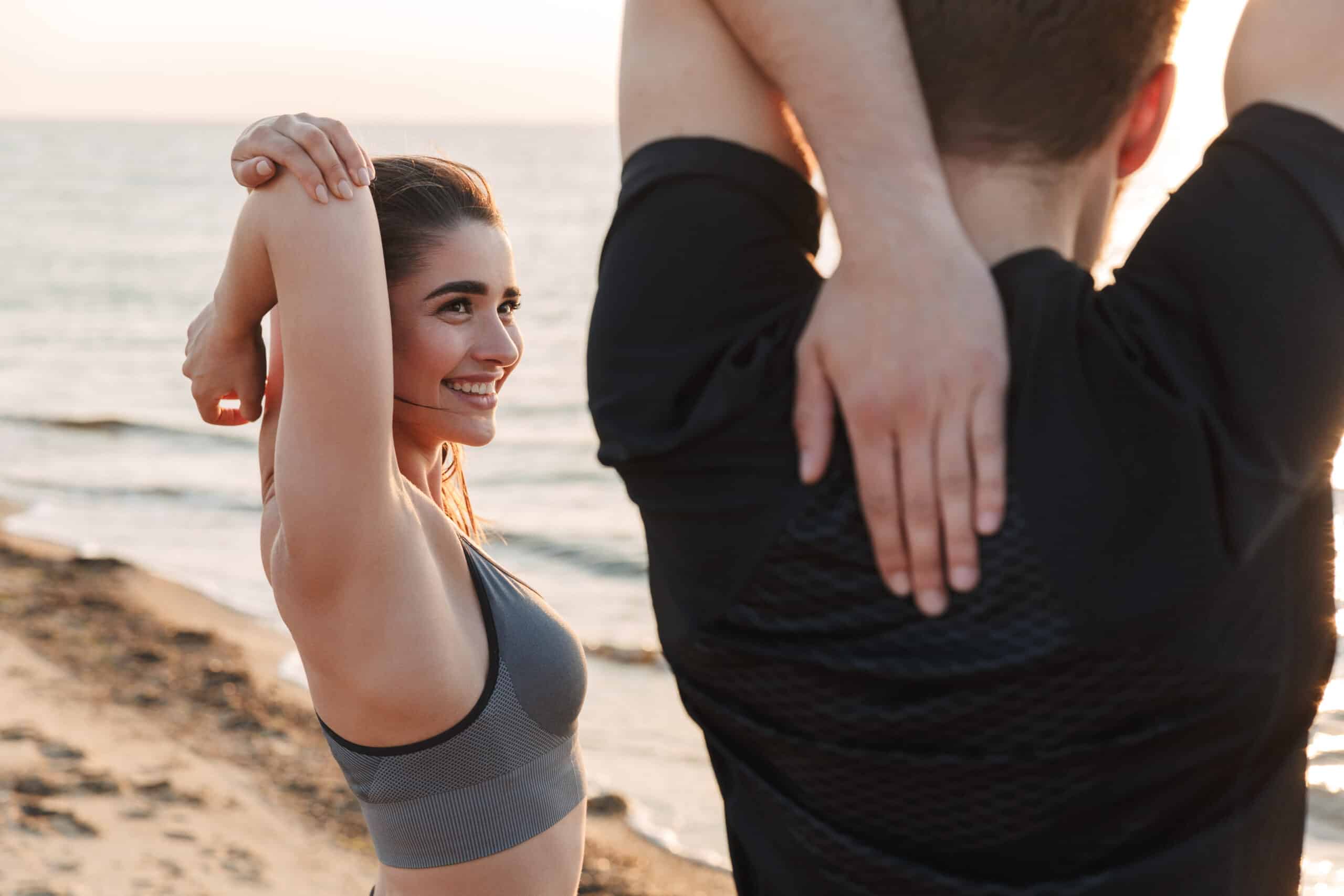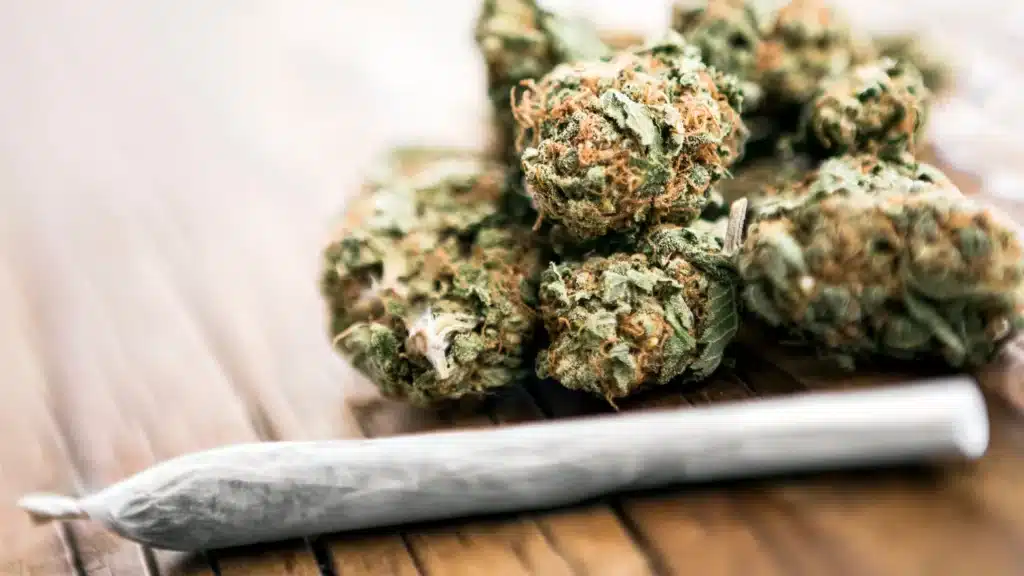Cannabis and Athletes: Does Smoking Weed Affect Athletic Performance?

Table of Contents
Cannabis is no longer a strictly black-market drug. THC (tetrahydrocannabinol) and CBD (cannabidiol) have been studied for their many potential wellness benefits, which have led to the establishment of medicinal cannabis programs across the United States and the legalization of hemp and CBD products available for purchase online and even at your local health stores.
Various communities are taking note of this, including athletes, who find both benefits to cannabis use for their sports performance.
In this article, we’ll take a closer look at some of the reasons why elite athletes and even casual gym goers or runners may want to integrate cannabis into their training, the scientific evidence supporting it, and the legal and health considerations that go along with it.
Why Do Popular Athletes Smoke Weed?

American Olympians like Michael Phelps and, more recently, Sha’Carri Richardson have faced controversy over their cannabis use.
Richardson’s case, in particular, sparked debate when the sprinter tested positive for marijuana, banning her from competing in the Tokyo Olympics after the US trials under the accusation that it was being used as a “performance enhancer.” This scandal raised questions about cannabis’ classification as a “performance-enhancing drug.”
Unlike anabolic steroids and amphetamines, cannabis isn’t known to provide the same type of physical or mental enhancements that would give them an unfair advantage over others. Instead, it’s mostly used for stress relief — as we can only imagine elite athletes under much pressure. So, the question remains: should the average person work out while high?
The answer to cannabis and physical performance isn’t exactly straightforward, but we’ll do our best to break it down.
The Potential Benefits of Cannabis For Working Out

When we chat about the perks of cannabis for athletes, it’s important to play by the rules, especially those set by the Food and Drug Administration, which means we have to be transparent about what cannabis can and can’t do. More specifically, we can’t say that smoking cannabis will cure, treat, or mitigate any disease.
With that being said, there’s plenty of anecdotal evidence of people enjoying cannabis use for working out, and there’s some empirical evidence evidence to back it up.
Cannabis Use for Relaxation
First up, THC — the main psychoactive component of cannabis — is noted for its ability to help with stress and relaxation in certain dosages. These relaxation effects can benefit athletes facing intense pressure before competitions, helping them stay calm and focused on the big day.
Reducing stress improves an athlete’s mental well-being and can indirectly enhance performance recovery by allowing for better sleep.
So, is there any empirical evidence yet behind this?
Research suggests that for athletes, consuming THC in low doses might help manage stress and nervousness associated with competition, allowing for better focus and potentially improving performance [1].
Unlike THC, CBD doesn’t get you high, making it a popular choice for many people looking to support relaxation without getting intoxicated.
A study published in the Journal of the American Pharmacists Association in 2020 reviewed the effectiveness of CBD for managing stress and related symptoms.
This review included randomized controlled trials and case reports/series, showing that CBD could potentially serve as an alternative solution for various stress-inducing conditions, but this isn’t yet a registered use for CBD [2].
The Potential Effects of Cannabis on Muscle Recovery
Cannabis research shows us that THC and CBD possess healing potential, which could help support one’s recovery process [3].
While more research is needed, many people already use these cannabinoids to reduce recovery time, allowing athletes to maintain a more consistent training schedule.
Enhanced Workout Experience and “Flow”
Have you ever been so into your workout that everything else fades away? That’s “flow” — and guess what? Some athletes find that cannabis gets them there quicker. It’s why many people swear by working out and weed or getting to that “runner’s high” sooner, making long-distance running much more enjoyable.
This could be because the psychoactive effects of THC help some people experience fewer external distractions, allowing them to become fully present in their sport.
Scientists aren’t exactly sure how cannabis works to do this, but the subjective reports from athletes highlight an increased sense of presence and connectivity with their physical activities. This enhanced workout experience can improve performance and make training more enjoyable and fulfilling.
The Cons of Cannabis and Athletic Performance

While cannabis has its potential pros for athletes, like anything else, it’s not without its downsides. These concerns range from legal issues to possible health risks and their impact on an athlete’s performance.
Legal and Professional Sports Restrictions
First and foremost, weed is still illegal under U.S. federal law and is a banned substance in many professional sports.
It’s the THC component that’s specifically restricted by the World Anti-Doping Agency (WADA). Interestingly, CBD has been removed from WADA’s prohibited list, opening a door for athletes to potentially benefit from this non-psychoactive cannabinoid without the risk of violating anti-doping regulations.
And we’ve seen more athletes endorse some hemp-derived THC and CBD products as part of their relaxation and training regimens.
Smoking Weed & Impact on Lung Health
Smoking weed and working out might have its drawbacks on the lungs over time.
While alternatives like vaping mitigate direct lung exposure, they could introduce other health risks if the vaping liquid or device isn’t made well, emphasizing the need for quality devices and cannabis extracts.
Impairment of Coordination and Judgment
Cannabis use might help some people get into the “flow,” but THC’s psychoactive effects in high doses can impair coordination and judgment, elevating the risk of accidents during activities. This impairment challenges athletes’ ability to perform safely and at their best, which is why this is an area you should proceed with cautiously.
Cannabis Dependence
Cannabinoids like THC and CBD aren’t psychically addictive. However, many people, especially those prone to drug and alcohol dependence, may develop a psychological dependence with chronic cannabis use when it comes to the psychoactive effects of THC.
The Grey Area: Hemp-Derived THC Products

Products like delta-9 THC gummies derived from hemp and THCA flower provide a legal way to experience the effects of cannabis and working out. It’s legal because the 2018 Farm Bill legalized hemp and hemp-derived compounds as long as they contain less than 0.3% THC by dry weight.
This distinction from weed, which has higher THC levels, allows these hemp products to be produced, sold, and consumed legally, albeit with certain restrictions and varying state laws.
But it is a balancing act as these products can still produce a high and result in positive drug tests.
Is Weed Bad For Athletes?
It’s not inherently bad or good.
There are certainly legal issues, societal stigma, and the potential for negative effects on lifestyle and performance with long-term misuse. However, when used responsibly, cannabis shows it has wellness benefits to offer.
Training Discipline and Cannabis
Cannabis use and athletic training discipline might either clash or coalesce, depending on the person and the nature of their training. On one side, cannabis’s potential for pain relief and stress support could be a benefit for athletes with rigorous training schedules by aiding recovery.
Conversely, the psychoactive effects of THC, such as altered perception and decreased motivation in some people, could undermine the strict discipline and focus required for optimal performance.
Balancing these aspects is a careful act, as is understanding the specific impacts on training and competitive outcomes.
Bodybuilding and Cannabis: A Double-Edged Sword
For bodybuilders, integrating cannabis into their routine can be a mixed bag.
On the one hand, cannabis, particularly CBD, is often used for recovery, pain relief, and stress, contributing positively to training outcomes.
However, THC often leads to increased appetite, or “the munchies,” which could disrupt the strict dietary regimes critical to bodybuilding success (which applies to all elite athletes, too).
On top of this, competitors should be wary that THC is a banned substance in professional sports, regardless of whether it is hemp or weed-derived, as it could impact eligibility and career progression.
Cannabis Regulation in Professional Sports
Sports organizations and leagues have mixed policies on cannabis use among pro athletes, reflecting a mix of stringent prohibitions, progressive relaxations, and nuanced approaches toward medical cannabis use.
Some organizations stick to the World Anti-Doping Agency’s (WADA) standards, which differentiate between prohibited substances like THC and permitted ones like CBD from hemp. Others, particularly in North American professional leagues, have begun to change policies on cannabis, reducing penalties.
The Takeaway: Cannabis and Athletes
Cannabis use in athletics is a complex topic, balancing potential benefits against legal and health risks.
What we do know is that there are components of cannabis that have their uses in medicine, which is why medical cannabis exists — but that doesn’t mean that all cannabis products on the market should be used to self-medicate or should be seen as a “performance-enhancing drug.” Because it isn’t.
Legal and health concerns, particularly around smoking and professional regulations, further complicate its use.
Meanwhile, hemp-derived options like delta-9 gummies and THCA flower provide legal routes in some regions, reflecting the evolving landscape of cannabis research and its acceptance.
With more interest in cannabis products in the fitness space, we can expect more research and shifts in attitudes toward use in the sports world, and we’ll be closely following this trend.
Frequently Asked Questions
Resources:
- Childs, E., Lutz, J., & de Wit, H. (2017, June 2). Low-dose THC can relieve stress; more does just the opposite. UIC Today. Retrieved from https://today.uic.edu/low-dose-thc-can-relieve-stress-more-does-just-the-opposite
- Skelley, J. W., Deas, C. M., Curren, Z., & Ennis, J. (2020). Journal of the American Pharmacists Association, 60(1), 253-261.
- Alshaarawy, O., & Elbaz, H. A. (2016). Cannabis use and blood pressure levels: United States national health and nutrition examination survey, 2005–2012. Journal of hypertension, 34(8), 1507-1512.






